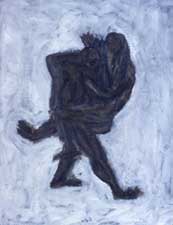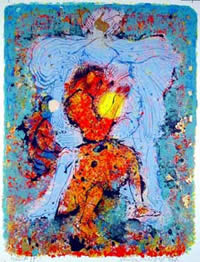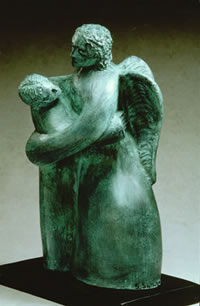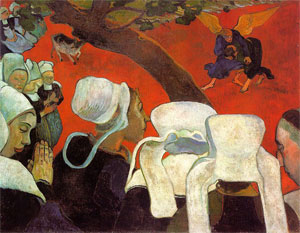Jacob:
Blessed by God and Limping Ever After
For Sunday October 21, 2007
Lectionary
Readings (Revised Common Lectionary, Year C)
Jeremiah 31:27–34 or Genesis 32:22–31
Psalm 119:97–104 or Psalm 121
2 Timothy 3:14–4:5
Luke 18:1–8
 |
Jacob Wrestles the Angel, oil, by Mel Pekarsky |
Jacob was a man on the run. He had his reasons.
Chronic dysfunctions and deep hostilities characterized Jacob's family history. Because his parents Isaac and Rebekkah played favorites, he and his fraternal twin Esau grew up hating each other. Jacob also swindled Esau out of his family birthright, which entitled him to a double share of the family inheritance. Later, he and his mother lied to swindle the family blessing from his blind and dying father.
When Esau threatened to murder him, Jacob fled to his uncle Laban in Haran, the very place his grandfather Abraham had departed. There he married his cousins Rachel and Leah, and eventually fathered thirteen children with them and his two slaves Zilpah and Bilhah. Sick of his father-in-law's manipulations, Jacob fled Laban, only to encounter his long lost and embittered brother Esau. The consummate deal-maker, Jacob concocted a bribe and sent a caravan of gifts along with his women and children across the river Jabbok. Perhaps that would pacify his brother's murderous threats?
Physically exhausted and deeply anxious about Esau, alone in the isolated wilderness, shorn of all his worldly possessions, at long last powerless to control his fate, Jacob collapsed into a deep sleep on the banks of the Jabbok River. With Laban behind him and Esau before him, he was too spent to struggle any longer. Darkness descended.
Then his real struggle began. Fleeing his family history had been bad enough; wrestling with God Himself was a different matter altogether. That long and lonely night an angelic stranger visited Jacob. They wrestled through the night hours until daybreak, at which point the stranger crippled Jacob with a blow to his hip that disabled him with a limp for the rest of his life. By then Jacob knew what had happened, declaring, "I saw God face to face, and yet my life was spared" (Genesis 32:30).
 |
Jacob and the Angel, Serigraph, 1965, by Shraga Weil. |
When it was over, the Deceiver, for such is the meaning of "Jacob" in Hebrew, received a new name, Israel, which means "he struggles with God." Most important and paradoxical of all, at the conclusion of that riverbank struggle, God "blessed him there" (Genesis 32:29). Yes, God blessed the deceiver who struggled in darkness.
In our culture and in our churches the myths of Superwoman and Superman live large. Columnist David Brooks of the New York Times calls this the "Achievatron" syndrome in his book On Paradise Drive. We celebrate wealth, power, strength, bravado, confidence, prestige and victory, beginning with Little League baseball for our kids and continuing right on through to their SAT scores, college admissions, first job, and first address.
We abhor and fear weakness, failure, struggle, and doubt. Even though we know that a measure of vulnerability, fear, discouragement and depression accompany most normal lives, we construe these as signs of failure or even a lack of faith. In real life, naieve optimism and the rosy rhetoric about the Achievatron are a recipe for disappointment and discouragement, for sooner or later reality catches up with most of us.
Jacob jerks us back to reality. In her book Scarred By Struggle, Transformed By Hope, the Benedictine nun and writer Joan Chittister uses the Jacob story as a paradigm for a "spirituality of struggle." In Jacob's story she identifies eight elements of our human struggle—change, isolation, darkness, fear, powerlessness, vulnerability, exhaustion, and scarring. But God doesn't leave us there, says Chittister, and in each human struggle she finds a corresponding divine gift—conversion, independence, faith, courage, surrender, limitations, endurance, and transformation. "Jacob does what all of us must do," writes Chittister, "if, in the end, we too are to become true. He confronts in himself the things that are wounding him, admits his limitations, accepts his situation, rejoins the world, and moves on."
 |
The end result of the nocturnal struggle for this greedy polygamist, cheater and liar was God's blessing: "God blessed Jacob there" (32:29). When you read further in Jacob's story these twin themes of dark struggles accompanied by divine blessing continue to be intertwined. His daughter Dinah was raped. Two of his sons, Reuben and Judah, committed incest. As if to mimic his own parents who favored him over his twin brother Esau, Jacob played favorites with his own son Joseph, sewing seeds of fraternal enmity for all. And yet, God renewed the covenant with him. "God appeared to him again and blessed him" (35:9). Late in life he reminisced, "God almighty appeared to me at Luz in the land of Canaan, and there He blessed me" (48:3).
Contrary to cultural assumptions about the Achievatron, the human struggle is never easy, and certainly not the struggle with God Himself. But the struggle is never devoid of divine presence and blessing. In The Lion, the Witch, and the Wardrobe, CS Lewis reminds us that the divine-human struggle is neither tidy nor tame, but it is still one we can embrace with confidence. Susan and Lucy ask Mr. and Mrs. Beaver to describe Aslan (Lewis's representation of Jesus). They ask if Aslan is a man. Mr. Beaver replies.
"Aslan a man? Certainly not. I tell you he is the King of the wood and the son of the great Emperor-beyond-the Sea. Don't you know who is the King of Beasts? Aslan is a lion—the Lion, the great Lion."
"Ooh!" said Susan. "I'd thought he was a man. Is he—quite safe? I shall feel rather nervous about meeting a lion."
"That you will, dearie, and make no mistake," said Mrs. Beaver, "if there's anyone who can appear before Aslan without their knees knocking, they're either braver than most or else just silly."
"Then he isn't safe?" said Lucy.
"Safe?" said Mr. Beaver. "Don't you hear what Mrs. Beaver tells you? Who said anything about being safe? 'Course he isn't safe. But he's good. He's the King, I tell you."
 |
Jacob Wrestles the Angel, by Paul Gauguin, 1888. |
Jacob's struggle at Jabbok reminds us that God is so very good, but He is not safe. We may struggle with Him through the night, but by daybreak He only intends to bless us.
For further reflection
* In the book Mother Teresa: Come Be My Light (2007), Mother Teresa's correspondence documents her fifty-year struggle with darkness and doubts, with "the absence of God's presence." “If I ever become a Saint," she wrote, 'I will surely be one of 'darkness.' I will continually be absent from Heaven—to light the light of those in darkness on earth.”
* What has been your own experience of the so-called "dark night of the soul?"
* Cf. Paul, who wrote that he was "harassed at every turn—conflicts without, fears within" (2 Corinthians 7:5).
* Frederick Buechner characterizes Jacob's divine encounter at Jabbok as the "magnificent defeat of the human soul at the hands of God." What might he mean?





